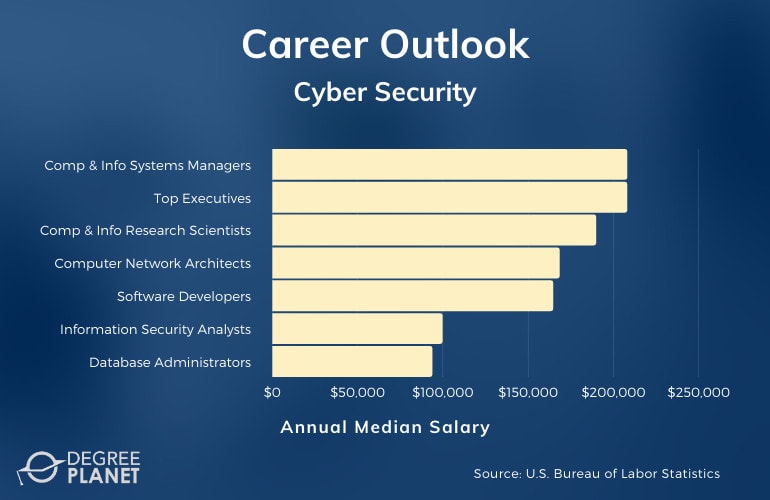Is a cyber security degree worth it? Cybercrime has quickly become one of the US’s fastest-growing security problems.

Editorial Listing ShortCode:
As a result, more cybersecurity experts are needed now more than ever before. If you have an interest in this field, a traditional or an online bachelor’s degree in cyber security can help give you access to higher-paying, in-demand jobs in cyber security.
The Value of a Cyber Security Degree

If you’re interested in the field of cyber security, you may be wondering if you need to earn a degree, especially a bachelor’s degree or higher, to get a job. It’s true that you can find someone every now and then who was self-taught and found his way into a cyber security job, but this is not the norm.
According to the Bureau of Labor Statistics (BLS), the market for cyber security jobs is projected to increase by 33% over the next ten years, which is impressive. The BLS also shows that most jobs within the cybersecurity field require employees to have at least a bachelor’s degree to obtain them.
The average annual salary is also significantly higher for people with bachelor’s degrees in the field as opposed to those with associate degrees or no degree. For example, the Bureau of Labor Statistics lists the median annual salary of an information security analyst with a Bachelor of Science in Information Security as being about $103,590.
An information security analyst with an Associate of Applied Science degree in the same field can only expect a median annual salary of about $60,060.
According to the Center on Education and the Workforce, an Associate of Science in Information Technology has an annual salary ranging between $30,000 and $40,000. A bachelor’s degree in the same field leads to an average salary of about $73,000 a year.
Editorial Listing ShortCode:
Those are fairly large differences in pay. Additionally, you’re much more likely to get a job with a bachelor’s degree and have access to a much larger job pool than you would with no degree or only an associate degree.
5 Things You Can Do with a Cyber Security Degree
After you’ve earned your bachelor’s degree in cyber or information security, there are several different careers you may be eligible for.
1. Cyber Security Analyst

Cyber security analysts typically have excellent problem-solving and teamwork skills, strong work ethics, and highly adaptable natures. Strong attention to detail and grace under pressure are also good traits to have.
As for technical skills, they should understand many aspects of computer science. Specifically, they typically need to know their way around Linux and have a good grasp of cryptography, risk assessment, computer information systems, and project management.
Their main focus is to protect a company’s computer networks and digital systems.
They may be required to design new protection software and implement new safety features to protect against malicious cyberattacks. They are also often required to teach other employees how to understand and use new software.
2. Cyber Security Consultant

Many of the same attributes that make a good cyber security analyst also make a good cyber security consultant. The jobs are similar in both scope and the skills they require.
The difference is a cyber security consultant almost always works exclusively as a third-party contract employee, whereas cyber security analysts typically work within a business or organization.
Editorial Listing ShortCode:
Another big difference between the two is that a cyber security consultant doesn’t just design and set up protections for a company’s computer system.
Consultants also work on the other side and act as threats to a company’s network. In this way, they can test and expose a company’s weaknesses. Then they can tell the company how to repair those weaknesses before it’s threatened by an outside attacker.
3. Vulnerability Analyst

In short, a vulnerability analyst is someone whose sole job is to test and find weaknesses in a company’s computer system. They then advise the company on how to repair and strengthen the weaknesses.
Vulnerability analysts are often asked to track weaknesses and breaches in systems, conduct scans of companys’ networks, and occasionally train employees to use new security software.
They may work for one single company or act as third-party consultants. They are typically expected to know a lot about ethical hacking because they have to behave and think like hackers to thoroughly test systems. Penetration testing is another part of the job.
4. Computer Research Scientist

Earning your degree in cyber security can help open the door to a variety of cyber security jobs. There are also potential job opportunities in other computer science fields. One option is to become a computer research scientist.
Editorial Listing ShortCode:
Computer research scientists work with existing technology and try to find new and innovative ways to use it. For this job, it is helpful to be creative and inventive as well as logical and analytical. Good leadership and teamwork skills are also very beneficial.
5. Software Developer

Cyber security degree programs typically require a lot of programming, programming languages, and software development courses. As a result, earning this degree can help you develop the skills you need to become an actual software developer.
Software developers design and create new software. They make computer games, operating systems, security programs, and more. They are the creative force behind new and evolving technology.
You may choose to focus on developing system software or software applications. Although this job isn’t strictly focused on cyber security, having a cyber security degree can help you design stronger, better-protected software and programs.
Cyber Security Careers & Salaries

Because the potential careers in cyber security vary widely for people with different degrees and at different points in their careers, it’s hard to lump all cyber security jobs together. Instead, it’s easier to group cyber security jobs into entry-level jobs, mid-career jobs, and jobs that pay the highest.
Below, we list some potential careers and associated salary data from the Bureau of Labor Statistics.
Entry Level Jobs for Cyber Security
Here are a few of the careers that graduates with bachelor’s degrees in this field can pursue.
| Careers | Annual Median Salary |
| Computer Programmers | $89,190 |
| Network and Computer Systems Administrators | $84,810 |
| Web Developers and Digital Designers | $77,200 |
| Computer Support Specialists | $55,510 |
These jobs usually require a bachelor’s degree or higher to qualify.
Mid-Career Jobs for Cyber Security

If you earn your bachelor’s degree and get a few years of experience under your belt, you may move into other, higher-paying cyber security jobs.
Editorial Listing ShortCode:
Here are some of the most popular mid-career jobs available in this field.
| Careers | Annual Median Salary |
| Information Security Analysts | $103,590 |
| Database Administrators and Architects | $98,860 |
| Computer Systems Analysts | $93,730 |
| Computer Programmers | $89,190 |
| Network and Computer Systems Administrators | $84,810 |
| Web Developers and Digital Designers | $77,200 |
Salaries may vary depending on the employer, work experience, regional location, and other factors.
Highest Paying Jobs for Cyber Security

Many of the highest paying jobs in cyber security require a graduate degree or a bachelor’s degree plus years of experience. According to the Bureau of Labor Statistics, the top 10% of earners in this field make the following salaries:
| Careers | Annual Salary |
| Computer and Information Systems Managers | $208,000 |
| Top Executives | $208,000 |
| Computer and Information Research Scientists | $194,430 |
| Computer Network Architects | $175,570 |
| Software Developers, Quality Assurance Analysts, and Testers | $170,100 |
There are slight differences in average pay for those in jobs that are considered mid-level, experienced, and late-career. These salaries provided are listed at the “experienced” level.

Is Cyber Security a Good Major?
This is a subjective question, but overall, yes, cyber security is a very good major for many. There are numerous open cyber security jobs in the United States alone that need people to fill them.
Editorial Listing ShortCode:
The BLS estimates a 33% growth projection for the next decade, and the average pay for most cyber security jobs is quite lucrative. If you have any interest in this field at all, this could potentially be a great major for you.
Is It Worth Getting a Degree in Cybersecurity?
Yes, getting a degree in cybersecurity is worth it for many professionals. The Bureau of Labor Statistics is projecting a 13% job growth in computer and information technology occupations over the next 10 years, much faster than the overall job growth.
Common careers in this field include network and computer systems administrators, computer programmers, web developers, information security analysts, and IT directors.
If you’re trying to break into the cyber security field, earning a degree in cyber security may be a good first step to doing that. Some entry-level cyber security positions only require an associate degree, thus making an associate degree in cyber security worth it for many students.
The higher-level jobs with the highest salaries are usually given to people with bachelor’s degrees or higher, though.
What Can You Do with a Cyber Security Degree?

There are many different careers you can pursue with a cyber security degree. Many of the most common jobs are in the cyber security field, such as penetration testers, cyber security analysts and consultants, and ethical hackers.
Because you’ll likely have a wide variety of computer science classes while working towards your cyber security degree, there are also several jobs you may be able to get that aren’t strictly related to cyber security. These include many jobs in the IT department. Network administrators, software developers, and computer research scientists are potential options as well.
How Difficult Is a Cyber Security Degree?
How difficult it will be for you to earn your degree in cyber security largely depends on you—your strengths, weaknesses, interests, and dislikes.
If you’re a detail-oriented person who enjoys working with computers and solving complex problems, this may not be that hard for you. Still, as with any other degree, there will likely be tougher classes and easier classes. It’ll be up to you to find a balance between them.
What Are a Cyber Security Degree’s Requirements?

Earning a bachelor’s degree in cyber security usually requires 120 hours worth of college credit.
Editorial Listing ShortCode:
You’ll likely take some general core education courses, a few electives, and several computer science courses, with a heavy emphasis on programming, information technology, and cyber/information security.
What Jobs Can You Get with a Masters in Cybersecurity?
Getting a master’s level degree can help open up access to all the cyber security jobs for people with associate and bachelor’s degrees. Additionally, it can help provide access to some other jobs available only to people with graduate degrees.
Potential careers at this level include chief information security officers, IT auditors, and cyber security managers, along with many other management, director, and senior-level jobs related to computer science and cyber security.
Do You Need a Graduate Degree for a Cyber Security Job?

While some of the highest-paying jobs in the cyber security field may be easier to get if you have a master’s degree, you don’t actually have to have a graduate degree to work in the field of cyber security.
In fact, according to the BLS, most of the available cyber security jobs require only that candidates have bachelor’s degrees, but some students have found that the potential for higher pay makes a masters in cyber security worth it.
What Is Cyber Security?
Simply put, cyber security is a field dedicated to protecting computers, computer networks, computer systems, and other digital and technological devices against hackers, cybercrime, and malicious attacks.
Cyber security professionals protect individuals’ and companies’ systems and devices from hacking, theft, blackmail, identity theft, and other types of damage caused by digital attacks.
Getting Your Cyber Security Degree Online

Every year, more and more businesses suffer from cyberattacks, hacking, and other types of cybercrime. As a result, the need for cyber security professionals is greater now than it’s ever been. If you have an interest in cyber, computer, or information security, there may never have been a better time to find a job in this field.
One way to get into the field is to earn your cyber security degree. There are several entry-level jobs that may let you in with only an associate degree. For the higher-paying jobs, though, you’ll likely want to work towards your bachelor’s degree.
Being able to do this online may make earning your degree faster and easier than ever. You may take online classes on your own schedule, with less interference with your job or other responsibilities. You can apply to an online program today and help make those dreams a reality.

